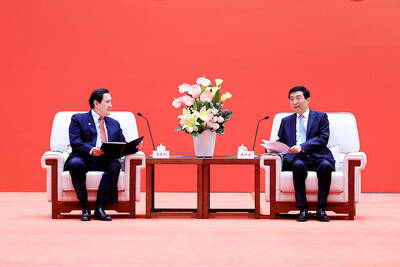Cirque du Soleil’s 56-show run of Alegria in Taipei sold out months before the premiere, which was a pleasant surprise for the internationally renowned circus.
“It actually doesn’t happen in many places in the world,” said Milan Rokic, Cirque’s Vice President of Marketing Asia-Pacific, in an interview with the Taipei Times. “We were very surprised and thrilled with the response. I think there must have been a pent-up demand or expectation for Cirque du Soleil’s arrival.”
Those who missed out on tickets to see Canada’s most famous theatrical export will have more chances to come.
Rokic said that Cirque plans to bring a different show to Taiwan within two years. “Our global tour plan will now include Taiwan, so it will become part of an Asia touring schedule,” he said. The group currently has six shows touring globally.
Cirque has grown quickly, having started as a “ragtag” group of Montreal street performers in 1984. It now has over 4,000 employees in 40 different countries, with 19 productions being performed simultaneously around the world.
While the group now enjoys worldwide recognition, it has had to make a few adjustments for the Chinese-speaking market, said Rokic.
“We’ve had to look at the name of our show in Chinese,” he said. “We were known in Hong Kong and mainland China after a while as Taiyang Maxi Tuan (太陽馬戲團). ‘Maxi’ (馬戲) was the traditional translation for circus but was more linked to an animal circus. So we renamed ourselves as ‘Taiyang Jutuan’ (太陽劇團), to get closer connected to international performing arts.”
Part of Cirque’s appeal is that it is not a “traditional circus,” said Rokic, who noted the Chinese name was meant to reflect a “more theatrical” aspect.

The canonical shot of an East Asian city is a night skyline studded with towering apartment and office buildings, bright with neon and plastic signage, a landscape of energy and modernity. Another classic image is the same city seen from above, in which identical apartment towers march across the city, spilling out over nearby geography, like stylized soldiers colonizing new territory in a board game. Densely populated dynamic conurbations of money, technological innovation and convenience, it is hard to see the cities of East Asia as what they truly are: necropolises. Why is this? The East Asian development model, with

Desperate dads meet in car parks to exchange packets; exhausted parents slip it into their kids’ drinks; families wait months for prescriptions buy it “off label.” But is it worth the risk? “The first time I gave him a gummy, I thought, ‘Oh my God, have I killed him?’ He just passed out in front of the TV. That never happens.” Jen remembers giving her son, David, six, melatonin to help him sleep. She got them from a friend, a pediatrician who gave them to her own child. “It was sort of hilarious. She had half a tub of gummies,

The wide-screen spectacle of Formula One gets a gleaming, rip-roaring workout in Joseph Kosinski’s F1, a fine-tuned machine of a movie that, in its most riveting racing scenes, approaches a kind of high-speed splendor. Kosinski, who last endeavored to put moviegoers in the seat of a fighter jet in Top Gun: Maverick, has moved to the open cockpits of Formula One with much the same affection, if not outright need, for speed. A lot of the same team is back. Jerry Bruckheimer produces. Ehren Kruger, a co-writer on Maverick, takes sole credit here. Hans Zimmer, a co-composer previously, supplies the thumping

There is an old British curse, “may you live in interesting times,” passed off as ancient Chinese wisdom to make it sound more exotic and profound. We are living in interesting times. From US President Donald Trump’s decision on American tariffs, to how the recalls will play out, to uncertainty about how events are evolving in China, we can do nothing more than wait with bated breath. At the cusp of potentially momentous change, it is a good time to take stock of the current state of Taiwan’s political parties. As things stand, all three major parties are struggling. For our examination of the